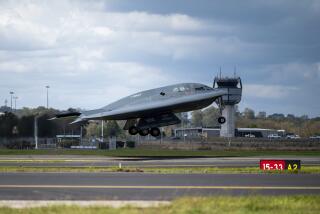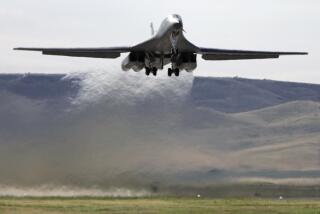Air Force Officials to Fight START Pact if B-2 Is Killed
- Share via
WASHINGTON — The nation’s highest-ranking nuclear field commander warned lawmakers Friday that he and other senior Air Force officials would oppose the Administration’s stance in the Strategic Arms Reductions Talks if Congress kills the stealth bomber program.
“I can tell you right now, I could not support a START agreement” without assurances that the Air Force would get the go-ahead to build the B-2 stealth bomber, Gen. John T. Chain Jr., chief of the Strategic Air Command, told the Senate Armed Services Committee.
“I would come and testify before your committee against a START agreement,” he said.
Echoing Chain’s remarks, Gen. Larry D. Welch, Air Force chief of staff, told the lawmakers that it is “largely inconceivable that we could continue with current negotiating positions without the B-2. In my view, we would simply have to go back to the drawing board and virtually start over in crafting some new negotiating position.”
Cuts in Both Chambers
The generals’ remarks were part of a push by the Air Force to preserve funding for the bomber, which has suffered cuts in the House and Senate. A showdown on the program is expected to come next week, when both chambers consider their defense bills.
Welch’s and Chain’s cautions drew an angry response from Sen. Timothy E. Wirth (D-Colo.), who called the warnings “a squeeze play,” and “a very dangerous political game.”
“Let’s debate the B-2 on its merits,” Wirth said in a statement issued late Friday. “Pressuring Congress to fund a weapon by threatening to derail START is not a very good way for the President to begin negotiations with Congress over defense budgets and arms control.”
The House bill would cut $800 million from the Pentagon’s $4.8-billion request for the bomber. The Senate bill proposes to trim $300 million from the program. The Senate Armed Services Committee’s draft bill also would bar the use of any B-2 funds in 1990 before the first series of flight tests is completed.
President Bush met Thursday and Friday with lawmakers, including several Republican skeptics, to rally support for the program. White House Press Secretary Marlin Fitzwater said the President would continue the effort next week by placing calls to other lawmakers.
Congressional supporters of the program Friday also called B-2 test pilots Bruce Hinds and Col. Richard Couch to witness tables in the House and Senate.
Welch, who was appearing before Congress for the third time in two weeks, argued that delaying the program or trimming the numbers of the bomber would only boost the plane’s price tag of about $530 million apiece.
“I think that would be tantamount to killing the program,” Welch said.
At an estimated cost of $70 billion, the 132-plane program has generated widespread “sticker shock” among lawmakers. Although the House and Senate Armed Services committees have rejected bids to kill the program outright, several lawmakers plan to propose amendments next week that would delay the program or scale back the number of planes built.
Welch told The Times that the Air Force’s Capitol Hill effort is designed to dissuade “people who would take bites out of the program” rather than to convert the “very few” he said would kill the program outright.
“Clearly, the reason we’re having this discussion, the reason we’re up here today, is not because of (the B-2’s) performance, its capabilities or its needs. It’s because of the cost. It’s the cost that critics have focused on.”
But Welch and Chain saved their strongest rhetoric for the B-2’s potential impact on arms control. Because of the unique counting scheme proposed for the arms agreement with the Soviet Union, they said, the bomber would become a nuclear workhorse if the treaty is concluded.
Under START constraints, for example, manned penetrating bombers like the B-1B and the B-2 would carry one-third of the United States’ strategic nuclear warheads, the Air Force maintains. Without such constraints, one-quarter of such warheads would be carried by bombers.
Under the proposed START counting rules, each side’s arsenal would be limited to 6,000 nuclear weapons, of which no more than 4,900 may be carried on long-range ballistic missiles. Each bomber aircraft and each air-launched cruise missile would count against the remaining 1,100 permissible weapons. The B-2, which can carry up to 50,000 pounds of bombs, thus would count only as a single weapon.
“As we evaluated the sufficiency of the START positions that we have advanced in these negotiations . . . we have particularly counted heavily on the contribution of the manned penetrating bomber,” Welch said. “I simply cannot believe that we could proceed with negotiations on that basis were we to have a drastically different expectation about the contribution of the manned penetrating bomber.”
More to Read
Sign up for Essential California
The most important California stories and recommendations in your inbox every morning.
You may occasionally receive promotional content from the Los Angeles Times.














